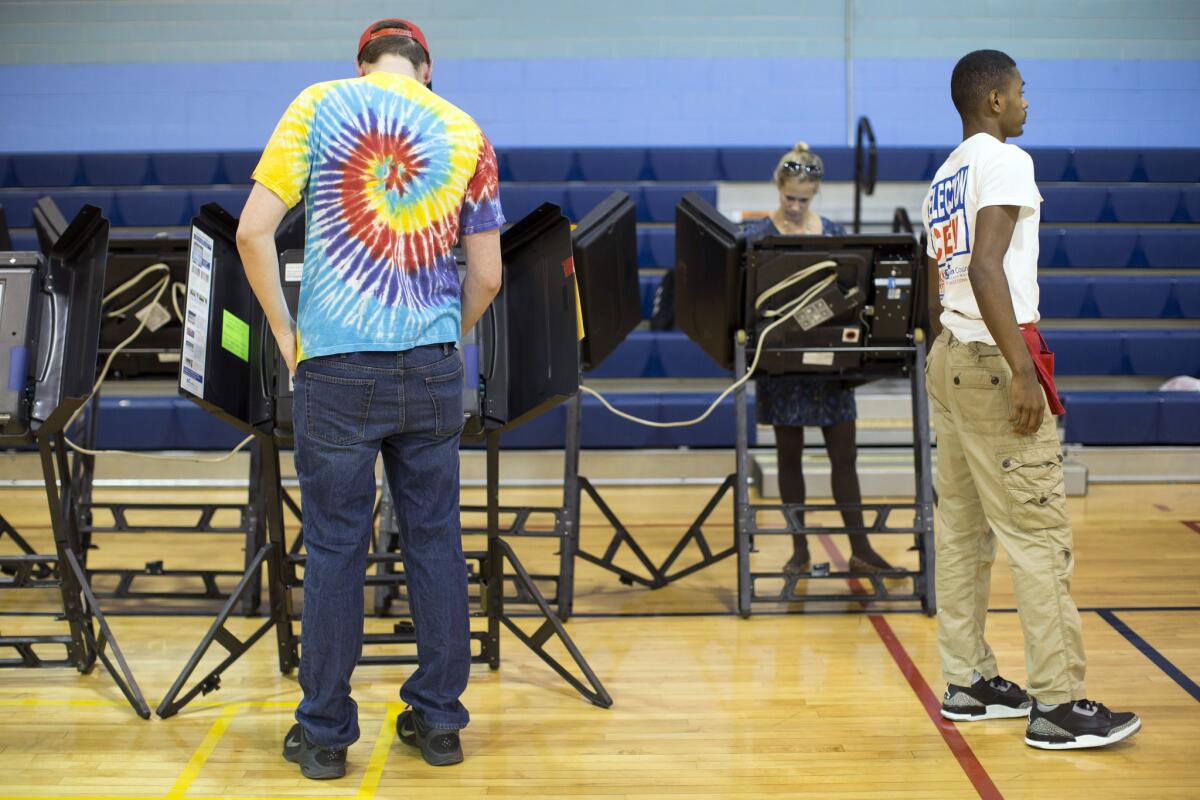Legalizing marijuana is gaining support, so why did Ohio vote against it?

Voters at the Schiller Recreation Center polling station in Columbus, Ohio, on Tuesday.
For years, Americans’ support for legalizing marijuana has been growing. Pollsters have felt the momentum. Solid majorities now respond that they want legal weed.
So what happened in Ohio on Tuesday, when voters voted 64% to 36% against a well-funded marijuana-legalization initiative to legalize recreational and medicinal marijuana, handing a high-profile defeat to the burgeoning legalization movement?
The answer is pretty simple, if you ask some marijuana supporters who opposed the measure: The small group of investors who drafted and promoted the initiative blew it by designing the law so that they would be the only commercial growers allowed in the state.
Opponents, and even some legalization proponents, called the investors monopolists. Or, as Tom Angell of the Marijuana Majority called them on Twitter, “You idiots,” also tweeting the hashtag #HowNotToLegalizeMarijuana.
Election losses can be bitter affairs among activists with competing visions, given how victories can trigger wide change while defeats can set back a cause.
Marijuana advocates across the country were closely watching the controversial Ohio effort as a crucial election year for marijuana looms in 2016. Voters in California, Massachusetts, Arizona, Nevada and Maine are expected to vote on legalization on the same ballot they’ll use to vote for the next president, according to the Marijuana Policy Project.
NEWSLETTER: Get the day’s top headlines from Times Editor Davan Maharaj >>
“Polls show a strong and growing majority of Americans think marijuana should be legal for adults,” the policy project’s spokesman, Mason Tvert, said in a statement Tuesday night. “There is a lot of momentum building behind the movement to end marijuana prohibition heading into 2016. Election Day was relatively uneventful this year, but next year it will be truly historic.”
Tvert added, “It’s pretty obvious that the outcome in Ohio does not reflect where the nation stands or the direction in which it is heading when it comes to marijuana policy.”
None of those measures closely resembles the defeated Ohio initiative, which was designed for its backers’ own profit.
The investor group drafted the Ohio initiative so that only 10 preselected lots of land in Ohio could be used to grow commercial marijuana. Those lots of land were already owned by the investors.
The mastermind of the measure, political consultant Ian James, acknowledged that he was going to make money.
“The honest and most easy response is: I am going to profit from this,” James told the Center for Public Integrity in June, which found that James’ firm was getting paid at least $5.6 million just to mount the campaign. “If people are upset about me making money, I don’t know what to say other than that that’s part of the American process. To win and make this kind of change for social justice, it does cost a lot of money.”
A small group of investors signed up with James’ campaign effort, called ResponsibleOhio, which promised a $1-billion wholesale marijuana market in a prospectus obtained by the Center for Public Integrity.
The 24 investors included notable Ohioans such as former NBA star Oscar Robertson, former boy-band celebrity Nick Lachey and descendants of President William Howard Taft.
The group even got its own grinning mascot, Buddie, a human-shaped marijuana bud who looked like he had been given a Superman costume and some really strong steroids.
The financial structure of the Ohio measure made many legalization supporters uncomfortable and proved an easy target for opponents.
When Lachey appeared in ads appealing for the passage of the bill, he was criticized for not mentioning he was an investor.
State politicians turned against the measure and presented voters with an “anti-monopoly” initiative to appear on the same ballot. That initiative, Issue 2, won 52% to 48%. It was designed to nullify the marijuana measure and ban special-interest groups from creating constitutional amendments for financial gain.
The Brookings Institution’s John Hudak wrote in an analysis that the loss was likely not a “death knell” for marijuana activists.
“In fact, I’m certain there are reform-minded individuals and organizations around the country that will be quietly pleased — or at least not shed tears — that Issue 3 failed, knowing that eventually another initiative, written in another way, on the ballot in another year, will likely pass,” wrote Hudak.
James, the ballot measure’s backer, signaled that he would be back, too.
“We started the conversation, and we’re going to continue the conversation starting tomorrow,” James said in a statement after the loss. “The status quo doesn’t work, it’s unacceptable and we’re not going away.”
Follow @MattDPearce for national news.
ALSO
Three small earthquakes rattle central Arizona
El Faro cargo ship wreckage positively identified 15,000 feet down
Federal judge slaps Justice Department for limits on medical marijuana
More to Read
Sign up for Essential California
The most important California stories and recommendations in your inbox every morning.
You may occasionally receive promotional content from the Los Angeles Times.











